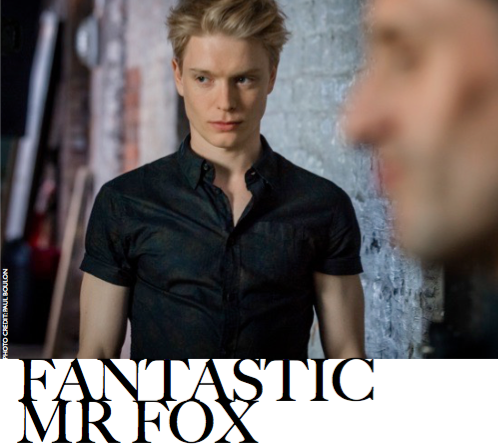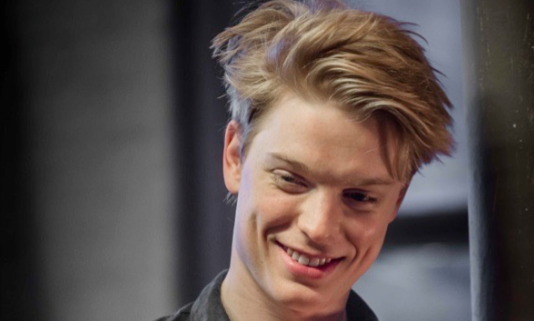Hammersmith born Freddie Fox is making his mark on his own terms, despite being part of the much talked about Fox dynasty. The Fox family are high profile media players, with generations of actors and agents. Freddie is the youngest of this prolific family, born in 1989. He refuses to define his sexuality as straight and isn’t afraid of getting his kit off (if the script demands it). In 2014 he starred alongside acting royalty in the blockbuster landmark film Pride and the critically acclaimed The Riot Club. We speak to Freddie about his latest role in Channel 4’s Cucumber and Banana.

This interview was taken from Issue 9 of THEGAYUK
TGUK: Can you explain a bit about Cucumber and Banana, and who you play?
FF: I play Freddie Baxter, who lives with Dean in the warehouse, and he also works at the insurance company that Henry and Dean work at, but in the canteen. He is 25, incredibly sexually confident, sexually powerful, and is an object of desire for Henry throughout the story. Initially there’s a very hostile dynamic between Freddie and Henry.
TGUK: What was it that attracted you to the role?
FF: Yeah, simply put, the scripts are so good and the stories are so interesting, the characters are so layered, and they all go on such incredible journeys. When I initially heard about the project, and the part I was up for playing, I was a bit ambivalent about it, because it sounded quite similar to parts I’d played recently. But then when I read the scripts and I realised there was no- one like this man, and there would never be anyone like this man on TV ever again. I realised I had to go for it.
TGUK: Freddie, your character’s a little cool and heartless, is that fair to say?
FF: In certain respects, he is heartless about certain things, but ultimately, no he’s not. He has got a heart, and a big one, but he just protects himself with an armour of sex and outward expressions of beauty. That’s so he can control other people, but that’s only there because it’s hiding aspects of his life that he simply will not show. As the friendship between Freddie and Dean and Henry grows, and they become more cemented together by their proximity at the warehouse, you see a much more humane and sensitive Freddie emerge. That’s why it’s such a layered, interesting character.
TGUK: You’ve described him somewhere as a nymphomaniac who gets his entire validation from sex. Is that right?
FF: More or less, yeah. He’s been sexualised from a young age – long before most of us are – and he happens to be very good at it. So he uses it as a way to protect himself and as a weapon, and also, because he’s good at it, as a way to validate his position in the world.
TGUK: Is it fun to play a character like that?
FF: What do you think?! [Laughs]
TGUK: The shoot involved living in Manchester for five months. Was that fun, and did you get to know the place a bit?
FF: Speaking as a non-Mancunian I was probably the one doing the most investigating, as Fis knows it like the back of his hand. I got to know it intimately and I love it. We saw Stockport, the suburbs, Didsbury where my character is from, so it’s great to hear the accent there. We went out a bit and had some fun.

TGUK: Did you go out and check out the gay scene in Manchester? What else did you do in the way of research?
FF: Yeah, we didn’t do as much of that as I’d expected. The first time I went to Manchester it was for a show about Boy George and we went out a bit then. For this we shot a lot on Canal Street and the atmosphere kind of pervades, even if you’re not there on a night out. There’s still a buzz there which Russell really wanted to convey. It’s very, very magnetic, and you can feel what it’s about without having to experience it.
TGUK: Freddie, is it true that you stayed in accent throughout the entire shoot?
FF: Yes I did. The accent’s really important for me. I’d never taken it as far as I did with this thought “I’m not going to get this wrong.” I stayed in voice the whole time, even when I was at home with my parents. They didn’t like it at all, but they are actors so they understood!
TGUK: What was it like working with the older actors?
FF: We learned a lot from the older actors. I’d like to point out they’re not old, just older than we are! They have more experience, and all of them also had a bedrock in the theatre, which was great because Fis and I have that too, so we had a sort of shorthand.
TGUK : You’re still young. Do you still feel like you’re learning your craft?
FF: Definitely, that really was one of the most special things on this job. The atmosphere created by Vincent and Russell on set was such that you really, really wanted to come in to work every day. As actors, we have the best job in the world, but occasionally it can be made difficult by ego and by not listening to each other and lack of communication. And on this job, it was just brilliant, and as a result, I think we all felt like we were doing our best work.
TGUK: Have you seen Queer as Folk?
FF: I hadn’t seen it before this job started, but I have now. I loved it. It was a brilliant piece of drama, and the writing was Vwhip-sharp.
TGUK: It was quite controversial when it first went out on Channel 4 15 years ago. Do you think some of the more risqué elements of Cucumber and Banana might cause a kerfuffle this time around?
FF: There should be, as well. Anything that moves public consciousness and public morality forward, which one hopes this show will do, has got to cause a stir otherwise it’s not done its job properly.
TGUK: Do you think Queer as Folk changed the nature of TV, or what was considered acceptable in a TV drama?
FF: I do yes. Everybody who I’ve spoken to who was conscious when Queer as Folk went out says it was a complete game- changer. It completely changed people’s perception of young, gay men especially. Suddenly they were successful, cool, sexy, out there, fun people you wanted to spend time with – not a stereotype. Obviously that was massive when it came out.


